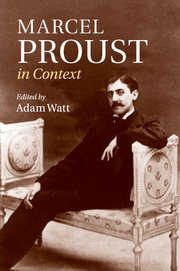Book contents
- Frontmatter
- Contents
- List of Illustrations
- Notes on contributors
- Figure I. Marcel Proust, portrait in oils by Jacques-Émile Blanche, 1892
- Preface
- Figure 2. Proust photographed on his death-bed by Man Ray, 1922
- Note on the text
- Chronology
- Part I Life and works
- Chapter 1 Life
- Chapter 2 Correspondence
- Chapter 3 Finding a form: Les Plaisirs et les jours to Contre Sainte-Beuve
- Chapter 4 Finding a voice: from Ruskin to the pastiches
- Chapter 5 Composition and publication of À la recherche du temps perdu
- Part II Historical and cultural contexts
- Part III Critical reception
- Further reading
- Index
- References
Chapter 4 - Finding a voice: from Ruskin to the pastiches
from Part I - Life and works
Published online by Cambridge University Press: 05 November 2013
- Frontmatter
- Contents
- List of Illustrations
- Notes on contributors
- Figure I. Marcel Proust, portrait in oils by Jacques-Émile Blanche, 1892
- Preface
- Figure 2. Proust photographed on his death-bed by Man Ray, 1922
- Note on the text
- Chronology
- Part I Life and works
- Chapter 1 Life
- Chapter 2 Correspondence
- Chapter 3 Finding a form: Les Plaisirs et les jours to Contre Sainte-Beuve
- Chapter 4 Finding a voice: from Ruskin to the pastiches
- Chapter 5 Composition and publication of À la recherche du temps perdu
- Part II Historical and cultural contexts
- Part III Critical reception
- Further reading
- Index
- References
Summary
His voice contains many voices. He is a magpie and a mimic. He veers this way and that, and takes the colouring of the company he keeps. Proust's narrator is both chorus and soloist.
As well as searching for a form and structure for his writing, Proust was also seeking a voice. Or, rather, he sought affirmation of his own originality, a confidence to experiment found through his engagement with the works of the polymath John Ruskin (1819–1900).
Marcel Proust possessed a keen ear and the gift of detecting inner rhythms, together with a highly developed visual, musical memory. He was acutely aware of this and jotted down in one of his exercise books:
As soon as I was reading an author, I could very soon make out the melody of the song underneath the words, different in one author from what it is in every other, and as I read, without realizing it, I would be humming it, hurrying the words, slowing them down or breaking off altogether, as one does when singing, when, depending on the tempo of the melody, one often waits a long time before saying the end of a word.
(ASB, 92; CSB, 303)- Type
- Chapter
- Information
- Marcel Proust in Context , pp. 27 - 33Publisher: Cambridge University PressPrint publication year: 2013
References
- 1
- Cited by



